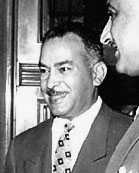This article needs additional citations for verification. (January 2007) |
Ali Sabri (Arabic: على صبرى, IPA: [ˈʕæli ˈsˤɑbɾi]; 30 August 1920[1] – 3 August 1991)[2] was an Egyptian politician of Turkish origin.[3]
Ali Sabri | |
|---|---|
على صبرى | |
 Sabri in 1966 | |
| Vice President of Egypt | |
| In office 30 October 1970 – 2 May 1971 | |
| President | Anwar Sadat |
| Preceded by | Anwar Sadat |
| Succeeded by | Mahmoud Fawzi |
| In office 3 October 1965 – 20 March 1968 | |
| President | Gamal Abdel Nasser |
| Preceded by | Anwar Sadat |
| Succeeded by | Hussein el-Shafei |
| 32nd Prime Minister of Egypt | |
| In office 29 September 1962 – 3 October 1965 | |
| President | Gamal Abdel Nasser |
| Preceded by | Gamal Abdel Nasser |
| Succeeded by | Zakaria Mohieddin |
| Director of the Egyptian General Intelligence Directorate | |
| In office 1956–1957 | |
| President | Gamal Abdel Nasser |
| Preceded by | Zakaria Mohieddin |
| Succeeded by | Salah Nasr |
| Personal details | |
| Born | Ali Sabri 30 August 1920 Cairo, Sultanate of Egypt |
| Died | 3 August 1991 (aged 70) Cairo, Egypt |
| Profession | Aristocrat, Military Officer, Politician, Intelligence Officer |
| Military service | |
| Allegiance | |
| Branch/service | |
| Rank | Marshal |
Family background
editHis parents, Dewlet Shamsi (mother) and Abbas-Baligh Sabri (father) were of Turkish-Circassian descent and belonged to the privileged class.
Ali Sabri was a grandson of nationalist Amin Shamsi Pasha (1833-1913) a member of the General Assembly and Provincial Council who in 1881-82 was a principal financial backer of Ahmed Urabi Pasha. Following the failure of what historian term the "Urabi Rebellion" of 1882, Khedive Tewfik imprisoned Shamsi Pasha later releasing him on a hefty bail. He resumed his seat at the General Assembly until his death.
Sabri was also a nephew of Ali Shamsi Pasha (1885-1962) co-founder of the Wafd Party and a several-time minister during the reign of Fuad I of Egypt later to become the first Egyptian to head of the National Bank of Egypt which acted as the country's Central Bank.[4]
One of Ali Sabri's paternal grand-uncles was Mohammed Faizi Pasha (1840-1911), a director-general of the Awqaf Department during the reign of Khedive Abbas Hilmi II.
The trilingual Ali Sabri, along with his three brothers and one sister, was raised in the then-predominantly aristocratic and European Cairo suburb of Maadi and was an active member of its Sporting Club's tennis and swimming teams.[5]
Egyptian revolution and premiership
editSabri was one of the second row of 1952 revolution officers, he was the head of Egyptian General Intelligence Directorate from 1956 to 1957. He was the 32nd Prime Minister of Egypt from September 1962 to October 1965.
When Gamal Abdel Nasser died in 1970, Anwar Sadat was regarded as Gamal Abdel Nasser's most likely successor, but Sabri was regarded as the next most likely. Both Anwar Sadat and Sabri had heart attacks which they survived at Gamal Abdel Nasser'sfuneral.[disputed – discuss]
Sabri was the vice-president and regarded as the no. 2 figure in Anwar Sadat's government. However shortly after Anwar Sadat came to power he was the most notable casualty of Anwar Sadat's "Corrective Revolution", and was imprisoned.[citation needed]
Regarded as a diehard socialist, he was often criticized for his upper-class background.[citation needed] Ali Sabri died in Cairo on 3 August 1991, aged 70.
Honour
editForeign honour
edit- Malaysia:
- Honorary Grand Commander of the Order of the Defender of the Realm (SMN (K)) - Tun (1965)[6]
- Czechoslovak Socialist Republic:
- Order of the White Lion (25 September 1964)[7]
References
edit- ^ Limited, Eurora Publications (1973). The Middle East and North Africa 1973-74. Europa Publications. ISBN 9780900362606.
{{cite book}}:|last1=has generic name (help) - ^ "على صبرى فى ذاكرة مصر المعاصرة بمكتبة الإسكندرية". اليوم السابع. 27 November 2014. Retrieved 11 March 2023.
- ^ Goldschmidt, Arthur (2000). Biographical dictionary of modern Egypt. Lynne Rienner Publishers. p. 171. ISBN 1-55587-229-8.
- ^ Privileged for Three Centuries: The House of Shamsy Pasha, Elias Press, Cairo, 2011
- ^ Privileged for Three Centuries: the house of Shamsy Padha, Elias Presx, Cairo, 2011
- ^ "Senarai Penuh Penerima Darjah Kebesaran, Bintang dan Pingat Persekutuan Tahun 1965" (PDF). Archived from the original (PDF) on 28 September 2018. Retrieved 15 June 2016.
- ^ "Československý řád Bílého lva 1923–1990" (PDF). prazskyhradarchiv.cz (in Czech). 28 January 2015. p. 159. Retrieved 6 May 2023.
External links
edit- Media related to Ali Sabri at Wikimedia Commons